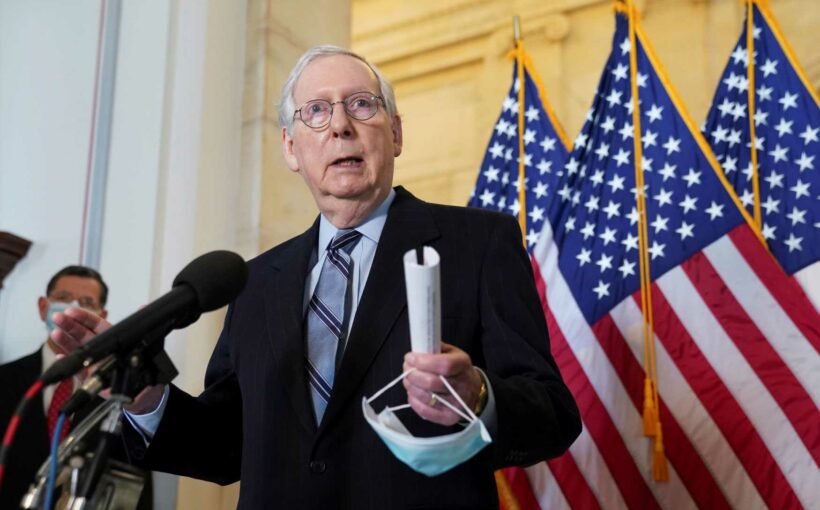- Senate Minority Leader Mitch McConnell said he sees Republican opposition to President Joe Biden's infrastructure plan, and vowed to fight the broader Democratic agenda.
- The comment all but assures Democrats would have to pass a more than $2 trillion infrastructure proposal on their own, unless they make major changes to win Republican support.
- The proposal outlined Wednesday invests in roads, bridges, airports, electric vehicles, broadband and water systems, and raises the corporate tax rate to 28% to offset the spending.
Any hopes that Washington could scrape together a bipartisan infrastructure package took a hit Thursday.
Senate Minority Leader Mitch McConnell, R-Ky., told reporters the more than $2 trillion plan the White House unveiled Wednesday "is not going to get support from our side." The proposal would invest in roads, bridges, airports, broadband, water systems, electric vehicles and job training programs, and raise the corporate tax rate to 28% to offset the spending.
The Republican also vowed to oppose the broader Democratic agenda under President Joe Biden, who passed his first major initiative last month in the $1.9 trillion coronavirus relief package.
"I'm going to fight them every step of the way, because I think this is the wrong prescription for America," McConnell said at a news conference in Kentucky.
CNBC Politics
Read more of CNBC's politics coverage:
- Here are the details of Biden's $2 trillion infrastructure plan
- White House studying supply chain 'stress tests' after semiconductor shortages
- Supreme Court appears willing to side with athletes in NCAA pay case
Unless 10 Republicans break with McConnell or Biden revises the plan to win GOP votes, his comment all but assures Democrats would have to use budget reconciliation to pass the infrastructure bill on their own. Biden has said he wants to win GOP support for the plan. But Republicans have opposed any tax increases, saying they could hinder the U.S. economic recovery.
Responding to McConnell on Thursday, White House press secretary Jen Psaki questioned whether the Republican Senate leader agrees that the U.S. needs to update its infrastructure and expand broadband access. She said Democrats and Republicans need to resolve differences over how to pay for the investments.
"If you don't want to raise the corporate tax rate — still lower than it's been over the last 70 years and across decades — if you don't want to do that, if you don't want to put in place a global minimum tax, what are the alternatives? We're happy to hear those proposals," she said.
Even if they use reconciliation, Democrats will have to balance competing interests among themselves to approve a bill. Some progressive lawmakers have called to include more ambitious measures to fight climate change in the plan. Meanwhile, Senate Majority Leader Chuck Schumer, D-N.Y., and other lawmakers from New York and New Jersey have pushed to include a repeal of the cap on state and local tax deductions in the plan. The change is expected to benefit higher-income taxpayers.
Biden and his advisors got initial Republican input on the Covid relief package, then moved to pass it on their own when they realized the GOP would accept only a much smaller bill than they sought. They appear to be taking a similar approach on infrastructure.
"We'll have a good-faith negotiation with any Republican who wants to help get this done. But we have to get it done," Biden said when unveiling the infrastructure plan in Pittsburgh on Wednesday.
No Republicans in Congress voted for Biden's broadly popular Covid plan. Corralling GOP support for another multitrillion-dollar bill — which includes tax hikes — appears more challenging.
"The odds are longer for Republican support on this," said Howard Fineman, an MSNBC contributor and a correspondent for RealClearPolitics, in a phone interview.
"The last thing was about fighting a disease, for God's sake, and they couldn't get any Republicans to vote for it," Fineman said. "This has less emotional heft in that sense."
Subscribe to CNBC on YouTube.
Source: Read Full Article
